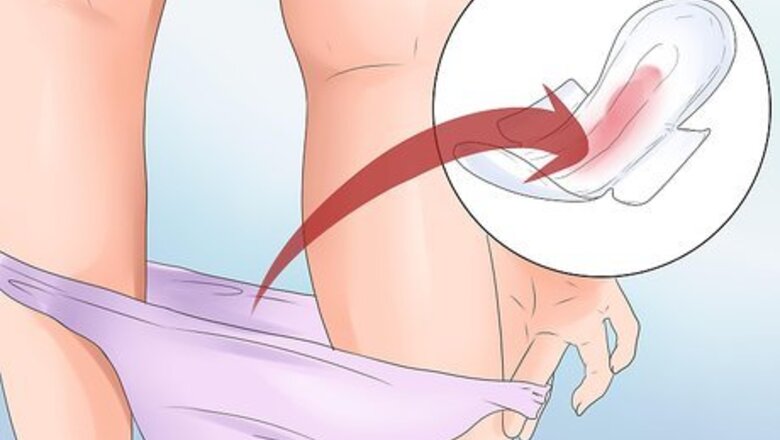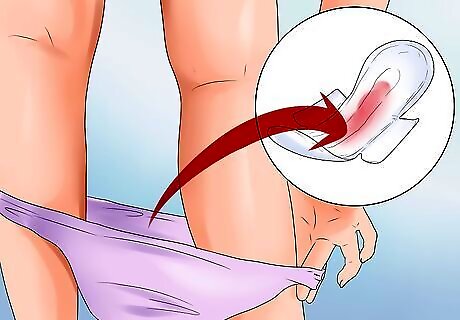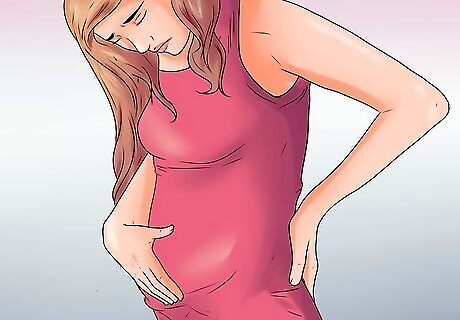
views
X
Trustworthy Source
Mayo Clinic
Educational website from one of the world's leading hospitals
Go to source
In many cases (especially early on, and if the bleeding is minimal) this can be completely normal. However, research suggests that continued bleeding can be worrisome and warrants evaluation by a physician, particularly if the bleeding is accompanied by pain, cramps, fever, dizziness or fainting.[2]
X
Trustworthy Source
Mayo Clinic
Educational website from one of the world's leading hospitals
Go to source
It is important to know strategies to handle and control bleeding if it occurs, and also to know when to see your doctor for additional help and treatment.
Assessing and Controlling the Bleeding

Keep track of the bleeding. It is very important to have an idea about the amount of blood loss during an episode of bleeding. This will help your doctor to make a possible diagnosis as well as establish a management plan. Start monitoring the amount of blood you are losing as soon as you notice the bleeding. You can do this by keeping a pad in your underwear until it is soaked. Count how many pads are soaked from 8 am one day to 8 am the next day. Keep a written record of this number, then bring it to your doctor for assessment. Also keep track of other characteristics of the bleeding, such as whether it is painful or painless, and intermittent or constant bleeding. This information describing your bleeding will be helpful to your doctor in figuring out what is at cause in the matter. Take note of the color of your blood (pink versus red versus brown), as well as the presence or absence of blood clots or other "tissue masses" that may come out alongside the blood. If you do have any tissue masses come out of your vagina alongside the blood, you may want to collect these in a container to show to your doctor, as this could be of assistance to her in diagnosing the cause of your problem.
Get plenty of bed rest. For minor bleeding in early pregnancy, rest is the ideal treatment. Physicians usually advocate complete bed rest for the first few days following the episode of bleeding. If the bleeding does not stop or diminish with rest, it is important to see your doctor for a more detailed assessment.
Avoid heavy work. Your physician will definitely advise you to avoid strenuous or heavy work such as weightlifting, climbing stairs frequently, running, cycling, etc. These activities cause jerking of the uterus and can rupture the delicate, newly-formed blood vessels in the placenta. Avoidance of these kind of activities is absolutely necessary, even if you only notice a tiny amount of bleeding. You should limit your physical activities and avoid heavy work for at least two weeks after the bleeding stops.
Put intercourse on hold for the time being. Sometimes intercourse can induce or aggravate bleeding from the vagina. If you experience bleeding during pregnancy, you should avoid intercourse until your doctor tells you it's safe. Normally, you will have to wait at least two to four weeks after bleeding has stopped.
Do not use tampons or try to douche. Do not insert anything into the vagina following vaginal bleeding. Absolutely avoid using tampons or douching, as these may injure the cervix or vaginal wall causing further bleeding. Douching may also introduce bacteria and other microorganisms into the vagina, leading to serious infection.
Stay hydrated. It's very important that you drink adequate amounts of fluid during a bleeding episode. This is particularly true if you have experienced severe bleeding. Drink at least eight cups of water daily to stay hydrated, and more. Bleeding correlates to fluid loss, so you will need to drink more than your normal to make up for the lost fluid. It is also important to stay well-hydrated for your baby's health and wellbeing.

Be aware of causes of vaginal bleeding in pregnancy. This can help to differentiate what may be going on in your particular case. Bleeding is actually quite common in the first trimester (in the first 12 weeks of pregnancy) and occurs for about 20 – 30% of women. Many of these cases of bleeding are benign, meaning they are not worrisome for the mother or the baby and may be due to the fetus implanting in the wall of the uterus or other physiologic changes of pregnancy. There are, however, more worrisome possibilities associated with higher volumes of blood loss and/or pain in the first trimester as well. These include the possibility of "ectopic pregnancy" (the baby has implanted in the fallopian tubes rather than the uterus), "molar pregnancy" (a rare condition in which abnormal tissue grows inside your uterus rather than a fetus), or a miscarriage. In 50% of cases of vaginal bleeding within the first 20 weeks of pregnancy, it indicates that a miscarriage is occurring. Bleeding later in pregnancy (in the second or third trimester) is more likely to be worrisome. Causes include problems with the placenta, problems with the uterus (especially if you have had a previous C-section), premature labor (defined as the onset of labor before 37 weeks), or also of course labor itself (if you are near the time of your due date). Additional causes of bleeding that may be unrelated to the pregnancy specifically include "trauma" (or injury to the vaginal wall) from sexual intercourse, cervical polyps (masses around the cervix that may bleed and that can be present in women irrespective of whether or not they are pregnant), cervical dysplasia (abnormal cells that can lead to cancer), and/or cervical cancer (one of the most prevalent forms of cancer for women who are not regularly screened with Pap tests).
Calculate your due date and consider whether or not your bleeding could mean that your labor has started. Pregnancy normally lasts for 40 weeks or 280 days. You can use this information to calculate your due date — just add nine calendar months and seven days from the first day of last menstrual period. For example, if your last period began 1st January, 2014, your due date is 8th October, 2014. Bleeding near your due date may indicate that your labor has begun. The typical range is from 10 days before to 10 days after the due date. You should immediately report to your doctor if your suspect that you might be in labor.
Know when to seek help from a medical professional. Any bleeding during pregnancy should be discussed with your physician in a timely manner. If the bleeding is accompanied by any of the following symptoms, it is recommended to be seen by a doctor as soon as possible in the emergency room for quick assessment and treatment: Severe pain or cramps Dizziness or fainting (signs of large blood loss) Tissue that comes out of your vagina alongside the blood (could be a sign of miscarriage) A fever and/or chills (could be a sign of infection) Severe bleeding that does not slow down or stop.
Knowing When to Seek Medical Help
Know that you can ignore very light bleeding. If you are bleeding very little (only a few drops), the blood is brown in color, it lasts less than one or two days, and is not associated with pain or cramps, then you can usually ignore it. Most likely it is implantation bleeding or the result of stretched blood vessels. Regardless of how light the bleeding is, you should avoid heavy work for a few days and meticulously monitor the amount of bleeding.
Seek medical help if you experiencing heavy bleeding. Any type of profuse bleeding during pregnancy should be regarded as an emergency. Profuse bleeding roughly means any amount of bleeding more than usual menstrual bleeding.
Pay attention to any pain or cramps you feel. Pain that comes and goes indicates contractions of the uterus, which means that the uterus is trying to expel the fetus. In early pregnancy, pain and cramping may be a sign of miscarriage and in third trimester it may indicate that you are going into labor. Therefore, if you experience any pain or cramping, you should contact your doctor immediately. True labor pain is regular and occurs at intervals. It gradually increases in intensity and duration and it associated with "show" (expulsion of mucus mixed with blood).
Seek help if you are dizzy or feeling faint. Dizziness or feeling faint are symptoms of massive blood loss.
Check your temperature. Bleeding accompanied by fever usually indicates an infection, such as infection in your uterus following natural miscarriage or abortion. As a result, any signs of fever should be brought to the attention of your doctor immediately.
Seek immediate help if you are passing tissue through your vagina. Passing a fleshy mass through your vagina is a serious indication of miscarriage. If this happens, you should contact your doctor immediately so he can evacuate the uterus if needed and thus control the bleeding.
Follow the instructions of your doctor post-treatment. Regardless of what caused vaginal bleeding (whether it was a miscarriage, an ectopic pregnancy outside the uterus, an infection, or the onset of labor), it will have caused significant stress to your body. In the great majority of cases your doctor will strongly advise rest, no strenuous exercise, often abstaining from sexual activity for a little while, and drinking lots of water. Be sure to heed your doctor's advice for recovery in order to maximize the speed at which you recover, as well as to prevent any other complications.




















Comments
0 comment